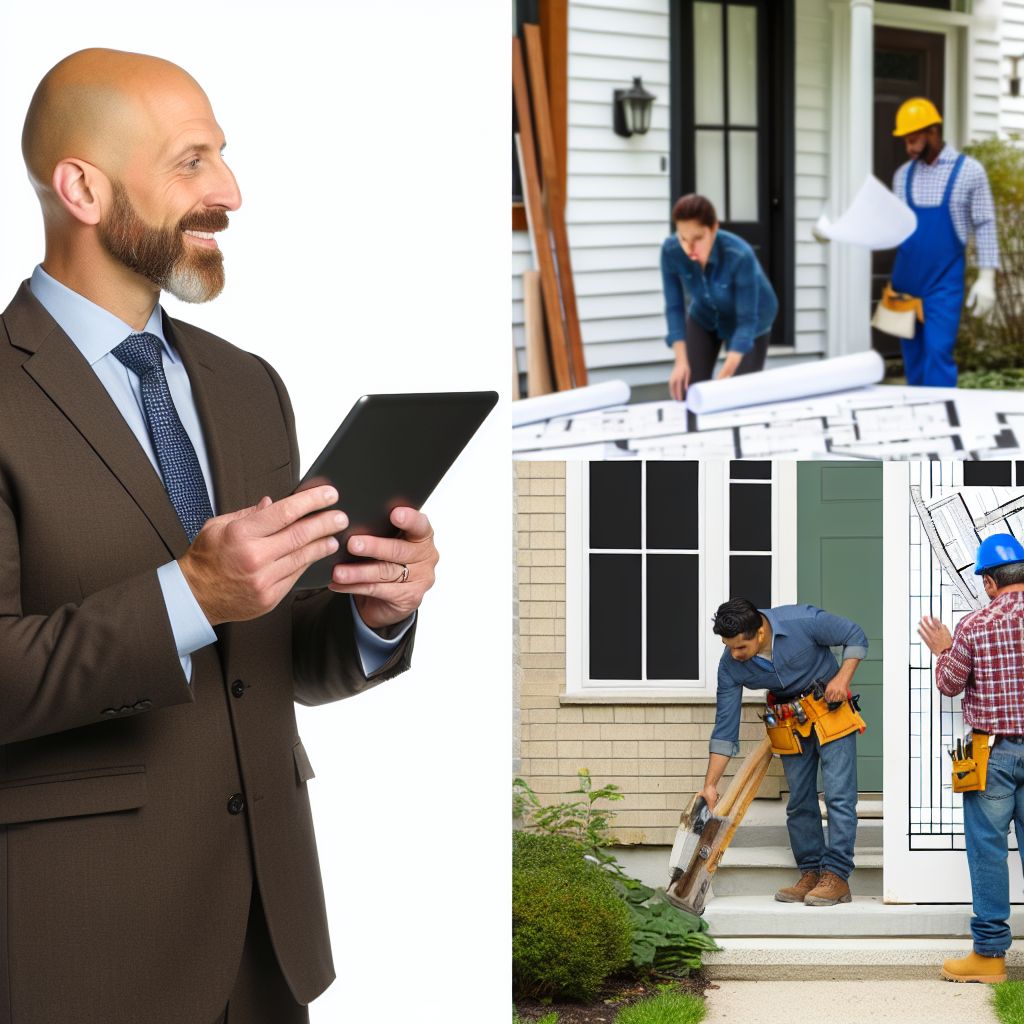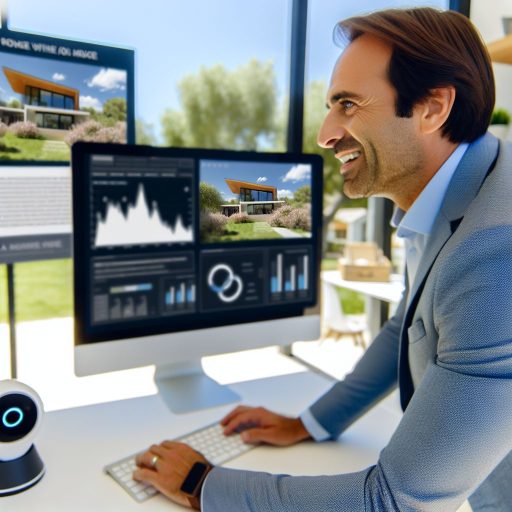Introduction to IoT in Residential Property Management
The Internet of Things (IoT) is reshaping property management.
This technology connects devices to the internet to streamline operations.
Property managers now use IoT to enhance efficiency and improve tenant experiences.
Moreover, it offers data-driven insights for better decision-making.
Understanding IoT Technology
IoT consists of interconnected devices that communicate over the internet.
Sensors can monitor various aspects of residential properties.
For example, smart thermostats control heating and cooling automatically.
This technology reduces energy consumption, leading to cost savings.
Benefits of IoT in Residential Property Management
Integrating IoT can significantly enhance operational efficiency.
Properties become easier to manage with real-time data and automation.
Further, it improves tenant satisfaction by providing modern conveniences.
Some benefits include:
- Predictive maintenance through sensor alerts.
- Increased security via smart locks and cameras.
- Remote access to property management functions.
Challenges in Implementation
Despite its advantages, IoT implementation faces several challenges.
Data security and privacy are major concerns for property managers.
Additionally, there are issues related to system integration and costs.
Transform Your Real Estate Decisions
Unlock personalized real estate insights crafted just for you. Get actionable advice designed to amplify your success.
Get StartedTraining staff to effectively use IoT tools is also essential.
Future Trends in IoT for Property Management
The future of IoT in residential property management looks promising.
Emerging technologies will drive further innovations.
Smart homes will become the norm, integrating more devices.
As a result, tenants will enjoy a seamless living experience.
Key Benefits of Implementing IoT Technologies in Properties
Enhanced Operational Efficiency
IoT technologies streamline property management tasks.
The automation of routine activities saves time and resources.
For instance, smart systems can take care of lighting and heating adjustments automatically.
This leads to improved energy efficiency and lower utility bills.
Consequently, property managers can focus on more strategic decisions.
Improved Tenant Experience
Smart home features significantly enhance tenant satisfaction.
Tenants enjoy personalized environments through smart thermostats and lighting.
Additionally, IoT devices enable seamless communication with property management.
For example, tenants can report issues instantly via smartphone apps.
Showcase Your Real Estate Business
Publish your company profile on our blog for just $200. Gain instant exposure and connect with a dedicated audience of real estate professionals and enthusiasts.
Publish Your ProfileThis fosters a sense of security and commitment to swift resolutions.
Predictive Maintenance
IoT technologies facilitate predictive maintenance for properties.
By using sensors, property managers can monitor system performance in real-time.
This anticipates potential issues before they escalate into costly repairs.
As a result, maintenance can be scheduled proactively, reducing downtime.
Moreover, this approach enhances the overall longevity of property assets.
Data-Driven Decision Making
The IoT ecosystem generates valuable data on property usage and tenant habits.
Property managers can analyze this data to uncover actionable insights.
This data can guide decisions on resource allocation and improvements.
Additionally, it enables customizations that cater specifically to tenant preferences.
By leveraging these insights, properties can remain competitive in the market.
Increased Security
IoT enhances security measures within residential properties.
Smart surveillance systems and alarms provide real-time alerts.
Furthermore, remote monitoring allows property managers to oversee activities outside typical hours.
This advanced security reduces the risk of theft and vandalism.
In effect, tenants feel safer and more at home in their living environments.
Examples of IoT Devices Used in Residential Management
Smart Thermostats
Smart thermostats optimize energy usage in homes.
These devices learn user preferences over time.
They allow remote control through mobile applications.
Furthermore, they can automatically adjust based on occupancy.
Home Security Systems
IoT-enabled security systems enhance home protection.
They include smart cameras and motion detectors.
Users can monitor their property in real time.
Alerts can be sent immediately to users’ smartphones.
Smart Lighting
Smart lighting systems provide convenience and energy savings.
Homeowners can remotely control lights from anywhere.
They can also set schedules for automatic operation.
Moreover, these systems can be integrated with voice assistants.
Smart Smoke and Carbon Monoxide Detectors
Smart detectors improve safety by providing real-time alerts.
They can notify homeowners of smoke or gas presence instantly.
Showcase Your Real Estate Business
Publish your company profile on our blog for just $200. Gain instant exposure and connect with a dedicated audience of real estate professionals and enthusiasts.
Publish Your ProfileMany devices send alerts directly to smartphones.
Additionally, they offer self-testing features for reliability.
Smart Appliances
Smart appliances increase efficiency in household tasks.
Devices like refrigerators, ovens, and washers can connect to Wi-Fi.
This connectivity allows for remote monitoring and control.
They often provide notifications about maintenance needs.
Smart Irrigation Systems
Smart irrigation systems help conserve water in gardens.
These devices adjust watering based on weather conditions.
Homeowners can monitor their irrigation systems via apps.
This technology promotes sustainable water usage practices.
Explore Further: Deep Learning in AI for Real Estate Market Predictions
Impact of IoT on Energy Efficiency and Sustainability
Enhancing Energy Management
IoT devices continuously monitor energy consumption in residential properties.
These smart devices provide real-time data to homeowners and property managers.
Consequently, users can identify high-consumption appliances quickly.
This awareness leads to informed decisions about energy use.
Moreover, it enables users to schedule energy-intensive tasks during off-peak hours.
As a result, homeowners can significantly reduce their energy bills.
Additionally, automating energy systems contributes to overall efficiency.
Facilitating Renewable Energy Integration
IoT solutions support the integration of renewable energy sources in homes.
This technology allows for better management of solar panels and wind turbines.
Homeowners can optimize energy usage based on real-time production data.
Consequently, they can maximize the benefits of renewable energy sources.
This leads to reduced reliance on non-renewable energy sources.
Furthermore, smart grids enhance the energy supply’s reliability and resilience.
Improving Sustainability Practices
IoT technology promotes sustainable practices in residential property management.
For example, smart irrigation systems optimize water usage in gardens.
These systems collect data on soil moisture levels and weather forecasts.
As a result, they water plants only when necessary.
This approach not only conserves water but also promotes healthier gardens.
Moreover, IoT can monitor air quality within residential areas.
Showcase Your Real Estate Business
Publish your company profile on our blog for just $200. Gain instant exposure and connect with a dedicated audience of real estate professionals and enthusiasts.
Publish Your ProfileConsequently, it enables timely interventions to maintain a healthy living environment.
Supporting Energy-Efficient Appliances
IoT technology enables the use of energy-efficient appliances.
These smart devices automatically adjust operational settings for efficiency.
For instance, smart thermostats learn user preferences and adjust temperatures accordingly.
This automation leads to energy savings while maintaining comfort.
Additionally, connected appliances can send alerts for maintenance needs.
Overall, proactive maintenance enhances appliance lifespan and efficiency.
Fostering Community-Wide Sustainability Initiatives
IoT can facilitate sustainability initiatives on a community level.
Data collected from residential buildings can inform local energy policies.
Local governments can use this data to improve infrastructure and resource allocation.
Furthermore, communities can collaborate on shared sustainability projects.
For example, neighborhood solar energy co-ops can benefit from collective investment.
This approach amplifies the impact of individual efforts in energy efficiency.
Find Out More: Understanding Blockchain-Based Mortgage Processing
Enhancing Security and Safety with IoT Solutions
Smart Security Systems
IoT-enabled security systems provide real-time surveillance.
These systems include smart cameras and motion sensors.
Homeowners can monitor their properties remotely via apps.
Additionally, users receive alerts for unusual activity.
This proactive approach helps prevent potential break-ins.
Automated Lighting Control
Automated lighting systems enhance security and energy efficiency.
Outdoor lights can activate based on movement detection.
Thus, properties appear occupied, deterring intruders.
Smart lighting can also be scheduled to mimic regular use.
Access Control Solutions
IoT technology offers advanced access control features.
Smart locks allow for keyless entry and remote management.
Homeowners can grant temporary access to guests or workers.
Furthermore, they can monitor entry logs in real-time.
Fire and Carbon Monoxide Detection
Smart sensors can detect smoke and carbon monoxide early.
These devices send alerts directly to users’ smartphones.
Quick notifications can save lives and prevent property damage.
Showcase Your Real Estate Business
Publish your company profile on our blog for just $200. Gain instant exposure and connect with a dedicated audience of real estate professionals and enthusiasts.
Publish Your ProfileAdditionally, many systems offer integration with local emergency services.
Neighborhood Safety Networks
IoT allows for the creation of neighborhood safety networks.
Residents can share information about suspicious activities.
Working together enhances overall community safety.
Such collaboration fosters trust and vigilance among neighbors.
Uncover the Details: Online Real Estate Platforms for Real Estate Investors

Data Analytics and IoT: Transforming Property Management Decisions
Enhancing Operational Efficiency
The Internet of Things (IoT) revolutionizes property management.
These interconnected devices gather real-time data from residential properties.
This automated data collection streamlines operations for property managers.
Consequently, managers save time and reduce costs associated with manual processes.
For instance, smart thermostats help optimize energy use.
They adjust heating and cooling based on occupancy patterns.
Data-Driven Decision Making
Data analytics enhances decision-making capabilities for property managers.
Analytics provides insights into resident behavior and property performance.
Property managers can identify trends and adapt strategies accordingly.
This proactive approach improves tenant satisfaction and retention rates.
For example, analyzing maintenance requests can pinpoint recurring issues.
Thus, managers can implement preventive measures to enhance property conditions.
Improving Tenant Engagement
IoT-driven solutions enhance tenant engagement and communication.
Smart home devices provide tenants with greater control over their living environment.
For instance, residents can manage security systems remotely.
Moreover, integrated communication platforms foster seamless interactions with management.
This fosters a sense of community and encourages feedback.
Cost Management and Resource Allocation
Data analytics allows property managers to manage costs effectively.
By analyzing utility usage, managers can identify inefficiencies.
They can then adjust resource allocation to minimize expenses.
For instance, smart meters provide detailed energy consumption data.
This data empowers managers to negotiate better rates with utility providers.
Compliance and Risk Management
IoT applications enhance compliance and risk management practices.
Regulatory standards often require detailed documentation of property conditions.
Showcase Your Real Estate Business
Publish your company profile on our blog for just $200. Gain instant exposure and connect with a dedicated audience of real estate professionals and enthusiasts.
Publish Your ProfileSmart sensors can monitor conditions, providing automatic reports.
Such reports can assist in fulfilling compliance requirements effortlessly.
Additionally, timely alerts for maintenance issues reduce potential liabilities.
Case Studies and Real-World Applications
Numerous property management firms have embraced IoT solutions.
For example, GreenLeaf Properties integrates smart technologies across its portfolio.
This integration has led to significant savings and improved service levels.
Another success story involves UrbanNest, which utilizes data analytics for decision-making.
They successfully reduced vacancy rates by analyzing market trends.
Future Directions: The Path Ahead
The future of property management lies in further IoT integration.
As technology evolves, so too will the capabilities of data analytics.
This evolution will enable even smarter decision-making processes.
Ultimately, property managers will enhance tenant experiences and reduce operational costs.
Clearly, the collaboration between IoT and data analytics is here to stay.
Explore Further: Real Estate Market Analytics Tools for Rental Property Analysis
Challenges and Considerations in Adopting IoT Technologies
Understanding the Initial Investment
Implementing IoT solutions requires a significant upfront investment.
Property managers must consider costs for devices, software, and installation.
Additionally, ongoing maintenance and subscription fees may arise.
Thus, budgeting becomes crucial for a successful implementation.
Addressing Data Privacy Concerns
The rise of IoT brings about significant data privacy issues.
Property managers must protect tenant data from breaches and misuse.
Investing in secure systems is essential to safeguard sensitive information.
This involves complying with local regulations surrounding data protection.
Ensuring Compatibility and Interoperability
Not all IoT devices are compatible with existing systems.
Property managers must ensure that new technologies can easily integrate.
This may involve selecting devices from reputable manufacturers.
Additionally, regular software updates should be part of the plan.
Training Staff for New Technologies
Adopting IoT solutions requires training staff for proper use.
Property managers must develop training programs that cover new technologies.
This training should address troubleshooting and basic maintenance tasks.
Moreover, fostering a culture of adaptability will enhance overall efficacy.
Showcase Your Real Estate Business
Publish your company profile on our blog for just $200. Gain instant exposure and connect with a dedicated audience of real estate professionals and enthusiasts.
Publish Your ProfileManaging Tenant Expectations
Introducing IoT technology changes how tenants interact with their living spaces.
Property managers must communicate benefits clearly to tenants.
Providing education about new features is critical for user adoption.
Furthermore, addressing any concerns can alleviate resistance to change.
Evaluating Long-term Benefits
Property managers should assess the long-term impacts of IoT adoption.
This includes evaluating energy savings, maintenance efficiencies, and tenant satisfaction.
Balancing initial challenges with potential benefits is essential.
Regularly reviewing performance metrics will inform future strategies.
Future Trends in IoT for Residential Property Management
Increased Automation
The trend toward increased automation is transforming property management.
Smart devices now manage energy use intelligently.
This shift leads to reduced operational costs for property managers.
Moreover, automated maintenance alerts facilitate timely repairs.
Such features enhance tenant satisfaction significantly.
Enhanced Security Solutions
Security systems are evolving with IoT technologies.
Smart locks and cameras provide remote monitoring for property owners.
This accessibility ensures greater peace of mind for tenants.
Furthermore, IoT systems can quickly alert authorities during emergencies.
These advancements create safer living environments.
Data-Driven Decision Making
IOT devices collect invaluable data from residential properties.
Property managers can analyze occupancy patterns and energy usage.
This information helps in making informed decisions about resource allocation.
As a result, managers can optimize property performance effectively.
Additionally, predictive analytics can anticipate maintenance needs, reducing costs.
Sustainable Practices
IoT implementation promotes sustainable practices in property management.
Smart meters track energy and water usage efficiently.
Such monitoring reduces waste and lowers utility costs.
Moreover, eco-friendly technologies appeal to environmentally conscious tenants.
Sustainability efforts elevate a property’s marketability.
Improved Tenant Experience
The integration of IoT enhances the overall tenant experience.
Smart home features provide comfort and convenience.
Showcase Your Real Estate Business
Publish your company profile on our blog for just $200. Gain instant exposure and connect with a dedicated audience of real estate professionals and enthusiasts.
Publish Your ProfileResidents enjoy functionalities like remote temperature control.
Moreover, seamless communication channels are vital for feedback.
Ultimately, happy tenants tend to renew leases consistently.
Additional Resources
Artificial intelligence – implications for real estate | JLL Research
Digital Transformation in Healthcare: Technology Acceptance and …




